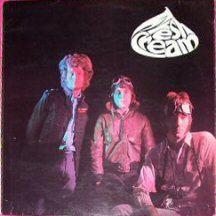
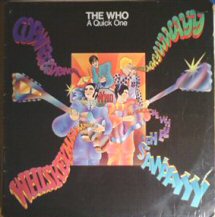
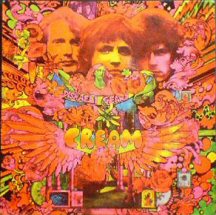
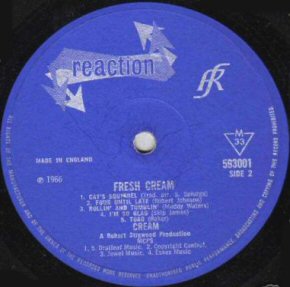
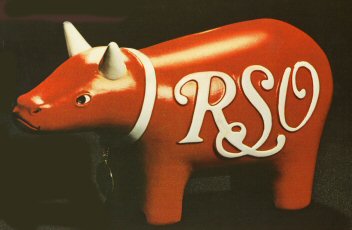 RSO Album Discography, Part 1:
RSO Album Discography, Part 1:Robert Stigwood was born in Adelaide, Australia in 1934. He went to England in the mid-fifties after
a career in advertising copy writing in Australia proved less than he had hoped. In England, he remained
in advertising, but this time worked in television, where he was doing casting for commercials. This
led to producing records for his customers, and eventually led to a #1 UK hit, John
Leyton's "Johnny Remember Me," in August 1961, six years after he started his career over in London.
For several years he worked as an independent producer in London, which was quite unusual at the
time. He eventually teamed with Brian Epstein to become co-manager of NEMS Enterprises. In 1966 set
up his own record company, the Reaction label, distributed by Polydor, whose main claim to fame was to
have released the Who's mid-sixties singles "Substitute," "I'm A Boy" and "Happy Jack", as well as their
album A Quick One and the first two Cream albums (Fresh Cream and Disraeli
Gears).

|

|

|

|
The Reaction albums. These were issued in the UK, while their American counterparts were on Atco (Cream) or Decca (Who). From left, Fresh Cream (Reaction 593 001), A Quick One (Reaction 593 002), and Disraeli Gears (Reaction 594 003). At near left is the Reaction label. |
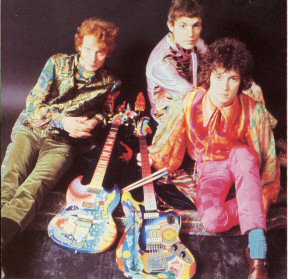 Although Fresh Cream sold well, Stigwood shipped them to New York to record their second
album, Disraeli Gears, under the tutelage of Atlantic Records' owner Ahmet Ertegun, studio
wizard Tom Dowd, and producer/bassist Felix Pappalardi. The result was an album almost universally
acclaimed as a classic, including the rock music standard "Sunshine of Your Love." About this time, the
group opted for a more psychedelic look. Clapton's straight hair was permed into a fuzzy ball, and
Clapton and Bruce had their guitars and Baker the drum head painted with psychedelic patterns. There
is a well-known video clip of the group playing "Strange Brew" on a television show about this time.
Interestingly, Bruce is playing a six-string electric bass, virtually unheard-of in those days. The
psychedelic look is in full regalia in the video clip.
Although Fresh Cream sold well, Stigwood shipped them to New York to record their second
album, Disraeli Gears, under the tutelage of Atlantic Records' owner Ahmet Ertegun, studio
wizard Tom Dowd, and producer/bassist Felix Pappalardi. The result was an album almost universally
acclaimed as a classic, including the rock music standard "Sunshine of Your Love." About this time, the
group opted for a more psychedelic look. Clapton's straight hair was permed into a fuzzy ball, and
Clapton and Bruce had their guitars and Baker the drum head painted with psychedelic patterns. There
is a well-known video clip of the group playing "Strange Brew" on a television show about this time.
Interestingly, Bruce is playing a six-string electric bass, virtually unheard-of in those days. The
psychedelic look is in full regalia in the video clip.
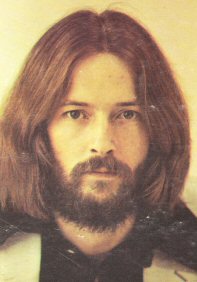 Eric Clapton, of course, went on to become acclaimed as one of the all-time great guitarists in the history
of rock music. After Blind Faith, he toured with Delaney and Bonnie Bramlett (as Delaney & Bonnie and
Friends), and put out a 1970 solo album featuring his hit "After Midnight." He then formed a group called
Derek & the Dominos, who recorded another of the all-time rock classic albums, Layla and Other
Assorted Love Songs in 1970. After a second, live, album, the first album issued on the RSO label,
Clapton continued on an ultimately very successful solo career, although the first few years were marred
by personal problems. It wasn't until 1974 that Clapton pulled himself together and restarted his career.
Eric Clapton, of course, went on to become acclaimed as one of the all-time great guitarists in the history
of rock music. After Blind Faith, he toured with Delaney and Bonnie Bramlett (as Delaney & Bonnie and
Friends), and put out a 1970 solo album featuring his hit "After Midnight." He then formed a group called
Derek & the Dominos, who recorded another of the all-time rock classic albums, Layla and Other
Assorted Love Songs in 1970. After a second, live, album, the first album issued on the RSO label,
Clapton continued on an ultimately very successful solo career, although the first few years were marred
by personal problems. It wasn't until 1974 that Clapton pulled himself together and restarted his career.
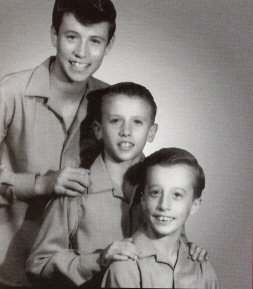 The Battle of the Blue and the Grey/Three Kisses of Love (Leedon LK-346, 1963)
The Battle of the Blue and the Grey/Three Kisses of Love (Leedon LK-346, 1963)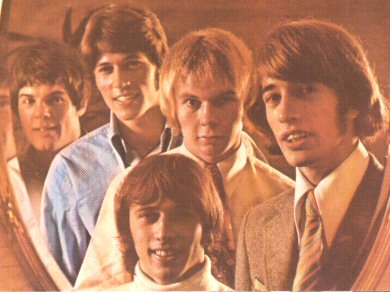 "New York Mining Disaster 1941" made #12 in England and #14 in the U.S. Four more top-20 U.S. hits
followed, "To Love Somebody" (#17), "Holiday" (#16), "Massachusetts" (#11), and "Words" (#15).The
next single, "Jumbo"/"The Singer Sang His Song," was a two-sided hit in the UK, but here "Jumbo" only
reached #57, while the flip could only muster #116. Undaunted, the group came right back with two
straight top-10 records, "I've Gotta Get a Message to You" (#8) and "I Started a Joke" (#6). Their next
five singles' chart peaks drifted downward alarmingly: "First of May" (#37), "Tomorrow Tomorrow" (#54),
"Don't Forget to Remember" (#73), "If I Only Had My Mind on Something Else" (#91), and I.O.I.O (#94),
and it looked like the group might have run its course. Added to the troubles were some personnel
issues, with Vince Melouney leaving the group in 1968 and Colin Peterson leaving in 1969. Internal strife
as to who was going to lead the group resulted in Robin Gibb quitting to go solo in 1969, so by the time
"Don't Forget to Remember" and the next two singles appeared, the Bee Gees were down to two
members, Barry and Maurice Gibb.
"New York Mining Disaster 1941" made #12 in England and #14 in the U.S. Four more top-20 U.S. hits
followed, "To Love Somebody" (#17), "Holiday" (#16), "Massachusetts" (#11), and "Words" (#15).The
next single, "Jumbo"/"The Singer Sang His Song," was a two-sided hit in the UK, but here "Jumbo" only
reached #57, while the flip could only muster #116. Undaunted, the group came right back with two
straight top-10 records, "I've Gotta Get a Message to You" (#8) and "I Started a Joke" (#6). Their next
five singles' chart peaks drifted downward alarmingly: "First of May" (#37), "Tomorrow Tomorrow" (#54),
"Don't Forget to Remember" (#73), "If I Only Had My Mind on Something Else" (#91), and I.O.I.O (#94),
and it looked like the group might have run its course. Added to the troubles were some personnel
issues, with Vince Melouney leaving the group in 1968 and Colin Peterson leaving in 1969. Internal strife
as to who was going to lead the group resulted in Robin Gibb quitting to go solo in 1969, so by the time
"Don't Forget to Remember" and the next two singles appeared, the Bee Gees were down to two
members, Barry and Maurice Gibb.
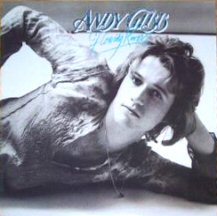 Stigwood added another Gibb brother to his roster in 1977. Andy Gibb, the youngest of the clan, struck
gold with his first two albums, mostly written by his older brothers. He reeled off three straight #1
records, "I Just Want to Be Your Everything," "(Love Is) Thicker Than Water," and "Shadow Dancing."
Following that auspicious debut, he had three more top 10 records, followed by two top-15 singles. By
the time he was cooling off in the charts in 1981, he was only 23 years old, and he picked up the hosting
job for the television show Solid Gold. Andy Gibb unfortunately died of a heart failure in 1988 at
the very young age of 30. (His older brother Maurice died of heart failure during an unrelated operation
in January, 2003 at the age of 52. Barry and Robin agreed at that time that the Bee Gees wouldn't be the
same, so they called a halt to the Bee Gees at that point.)
Stigwood added another Gibb brother to his roster in 1977. Andy Gibb, the youngest of the clan, struck
gold with his first two albums, mostly written by his older brothers. He reeled off three straight #1
records, "I Just Want to Be Your Everything," "(Love Is) Thicker Than Water," and "Shadow Dancing."
Following that auspicious debut, he had three more top 10 records, followed by two top-15 singles. By
the time he was cooling off in the charts in 1981, he was only 23 years old, and he picked up the hosting
job for the television show Solid Gold. Andy Gibb unfortunately died of a heart failure in 1988 at
the very young age of 30. (His older brother Maurice died of heart failure during an unrelated operation
in January, 2003 at the age of 52. Barry and Robin agreed at that time that the Bee Gees wouldn't be the
same, so they called a halt to the Bee Gees at that point.)
|
Cover |
Number - Title - Artist - [Release Date] (Chart) Contents |
|
Pre-Stigwood Bee Gees Albums (Released in Australia):
| |
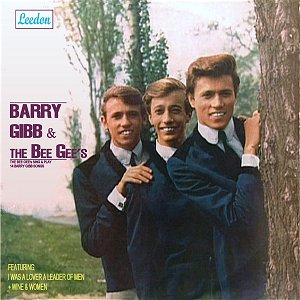
|
Leedon LL31801 - Barry Gibb & the Bee Gees Sing and Play 14 Barry Gibb Songs ["The Bee Gees
Album"] - Barry Gibb & the Bee Gees [1965] I Was A Lover, A Leader Of Men/I Don't Think
It's Funny/How Love Was True/To Be Or Not To Be/Timber/Claustrophobia/Could It Be//And The
Children Laughing/Wine And Women/Don't Say Goodbye/Peace Of Mind/Take Hold Of That Star/You
Wouldn't Know/Follow The Wind
|
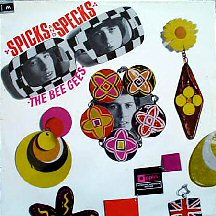
|
Spin EL 32031 - Spicks and Specks of the Bee Gees - Bee Gees [1966] First issued as
Monday's Rain, with "All of My Life" instead of "Spicks and Specks." Monday's Rain/How Many
Birds/Play Down/Second Hand People/I Don't Know Why I Bother With Myself/Big Chance//Spicks And
Specks [replaced "All of My Life"]/Jingle Jangle/Tint Of Blue/Where Are You?/Born A Man/Glass House
|
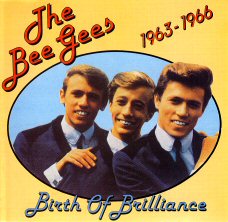
|
Festival D 45813/4 - The Bee Gees 1963-1966: Birth of Brilliance - Bee Gees [198?]
Originally released on vinyl as Infinity L 45813/4 in 1978. A 2-CD collection of their Australian sides from
their original label, including some previously unreleased takes. All tracks mono. Disc 1 (38:21):
Wine And Women/I Was A Lover A Leader Of Men/Timber/Claustrophobia/Could It Be/Peace Of
Mind/To Be Or Not To Be/I Don't Think It's Funny/The Three Kisses Of Love/The Battle Of The Blue And
The Grey/Theme From Jamie McPheeters/Turn Around Look At Me/Everyday I Have To Cry/How Love
Was True/You Won't See Me/Lonely Winter; Disc 2 (43:16): In The Morning (original version of
"The Morning of My Life")/Like Nobody Else/All By Myself/Storm/Butterfly/Terrible Way To Treat Your
Baby/Exit Stage Right/Coalman/I Am The World/Cherry Red/I Want Home/Monday's Rain (alternate
version)/How Many Birds/Secondhand People/Born A Man/Spicks And Specks
|
|
Pre-RSO Issues on Atco (Distributed by Atlantic):
| |
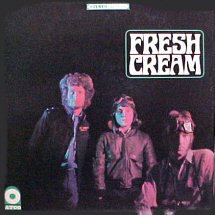
|
33-206/SD 33-206 - Fresh Cream - Cream [1/67] (5-67, #39) The US version has a
somewhat different cover from the British version on the Reaction label, and a different track lineup that
substituted "I Feel Free" for "Spoonful". Oddly, "I'm So Glad" is rechanneled; this studio version was
finally remixed in true stereo in 2002 on an Eric Clapton compilation. Liner notes state, "A Robert
Stigwood Organisation (London) Production. This album was originally released in England on the
REACTION label, distributed by Polydor Records, Ltd. (London). It is released in the U.S.A. by special
arrangement with Polydor Records, Ltd." I Feel Free (S)/N.S.U. (S)/Sleepy Time Time (S)/I'm So Glad
(E)/Dreaming (S)/Sweet Wine (S)/Cat's Squirrel (S)/Four Until Late (S)/Rollin' and Tumblin' (S)/Toad (S)
|
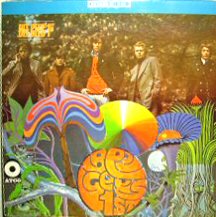
|
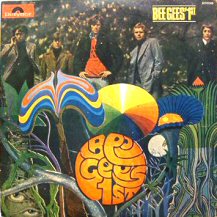 33-223/SD 33-223 - Bee
Gees' 1st - Bee Gees [1967] (8-67, #7) Five members of the group are pictured. "A Robert
Stigwood Production for Reaction Records, London, England." Issued on Polydor outside the US (see
cover at right). Turn of the Century/Holiday/Red Chair, Fade Away/One Minute Woman/In My Own
Time/Every Christian Lion Hearted Man Will Show You/Craise Finton Kirk Royal Academy of Arts//New
York Mining Disaster 1941/Cucumber Castle/To Love Somebody/I Close My Eyes/I Can't See
Nobody/Please Read Me/Close Another Door 33-223/SD 33-223 - Bee
Gees' 1st - Bee Gees [1967] (8-67, #7) Five members of the group are pictured. "A Robert
Stigwood Production for Reaction Records, London, England." Issued on Polydor outside the US (see
cover at right). Turn of the Century/Holiday/Red Chair, Fade Away/One Minute Woman/In My Own
Time/Every Christian Lion Hearted Man Will Show You/Craise Finton Kirk Royal Academy of Arts//New
York Mining Disaster 1941/Cucumber Castle/To Love Somebody/I Close My Eyes/I Can't See
Nobody/Please Read Me/Close Another Door
|
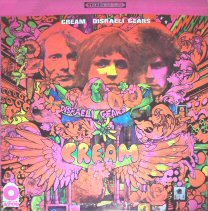
|
33-232/SD 33-232 - Disraeli Gears - Cream [12/67] (12-67, #4) "Produced by Felix
Pappalardi, by arrangement with Robert Stigwood. Released in the U.S.A. by special arrangement with
Polydor Records, Ltd., London." Strange Brew/Sunshine of Your Love/World of Pain/Dance the Night
Away//Blue Condition//Tales of Brave Ulysses/SWLABR [She Was Like A Bearded Rainbow]/We're
Going Wrong/Outside Woman Blues/Take It Back/Mother's Lament
|
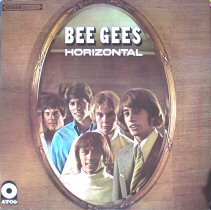
|
33-233/SD 33-233 - Horizontal - Bee Gees [1968] (2-68, #12) All five members of the
group are pictured. "Produced by Robert Stigwood and the Bee Gees for Reaction
Records." World/And the Sun Will Shine/Lemons Never Forget/Really and Sincerely/Birdie Told Me/With
the Sun in My Eyes//Massachusetts/Barry Braff/Day Time Girl/The Earnest of Being George/The Change
is Made/Horizontal
|
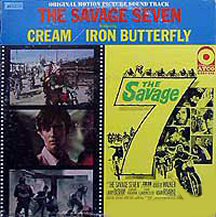
|
SD 33-245 - The Savage Seven (Soundtrack) - Various Artists [1968] This album is the
soundtrack for one of the seemingly endless series of biker flicks of the 1960s. The album was
produced by Mike Curb, but Cream's "Anyone for Tennis" was produced by Felix Pappalardi as a special
project right after Disraeli Gears. Robert Stigwood is not credited on the album. As a followup to
"Sunshine of Your Love," "Anyone for Tennis" was surprisingly weak, only reaching #64. Anyone For
Tennis (Theme From "The Savage Seven") - Cream (S)/Desert Ride - Jerry Styner (S)/Maria's Theme
(Vocal) - Barbara Kelly & The Morning Good (S)/Shacktown Revenge - Jerry Styner (S)/The Medal -
Jerry Styner (S)/Here Comes The Fuzz - Jerry Styner (S)/Iron Butterfly Theme - Iron Butterfly
(S)//Unconscious Power - Iron Butterfly (S)/Everyone Should Own A Dream - Jerry Styner (S)/The Deal -
Jerry Styner (S)/Desert Love - Jerry Styner (S)/Ballad Of The Savage Seven - Barbara Kelly & The
Morning Good (S)/Maria's Theme (Instrumental) - Jerry Styner (S)/The Savage Struggle - Jerry Styner
(S)
|
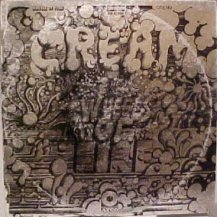
|
SD 2-700 - Wheels of Fire - Cream [1968] (7-68, #1) (2-LP set) "Produced by Felix
Pappalardi by arrangement with Robert Stigwood." Disc 1: White Room/Sitting on Top of the
World/Passing the Time/As You Said//Pressed Rat and Warthog/Politician/Those Were the Days/Born
Under a Bad Sign/Deserted Cities of the Heart; Disc 2: Crossroads/Spoonful//Traintime/Toad
|
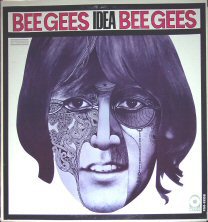
|
SD 33-253 - Idea - Bee Gees [1968] (8-68, #17) Cover shows all five members of the
Bee Gees. "Produced by Robert Stigwood and the Bee Gees." Let There Be
Love/Kitty Can/In the Summer of His Years/Indian Gin and Whisky Dry/Down to Earth/I've Gotta Get a
Message to You//Idea/When the Swallows Fly/I Have Decided to Join the Air Force/I Started a
Joke/Kilburn Towers/Swan Song
|
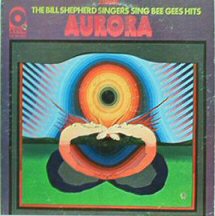
|
SD 33-262 - Aurora: The Bill Shepherd Singers Sing Bee Gees Hits - Bill Shepherd
Singers [1968] Shepherd was the arranger of the Bee Gees albums. Massachusetts/Turn of the
Century/Words/Red Chair Fade Away/Birdie Told Me/Swan Song//New York Mining Disaster
1941/World/Daytime Girl/The Singer Sang His Song/Holiday/And the Sun Will Shine
|
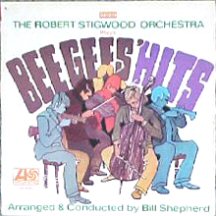
|
Atlantic SD 8195 - The Robert Stigwood Orchestra Plays the Bee Gees Hits - Robert
Stigwood Orchestra [1968] Massachusetts/Birdie Told Me/Words/To Love Somebody/Sinking
Ships//New York Mining Disaster 1941/I Can't See Nobody/Holiday/World/Swan Song
|
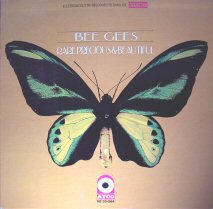
|
SD 33-264 - Rare, Precious and Beautiful - Bee Gees [1968] (12-68, #99) A compilation
of sides recorded in Australia for Festival Records. Liner notes by Robert Stigwood. "Released in the
U.S.A. by special arrangement with Polydor Records, Ltd." Where Are You (E)/Spicks And Specks
(E)/Playdown (E)/Big Chance (E)/Glass House (E)/How Many Birds (E)//Second Hand People (E)/I Don't
Know Why I Bother Myself (E)/Monday's Rain (E)/Tint of Blue (E)/Jingle Jangle (E)/Born A Man (E)
|
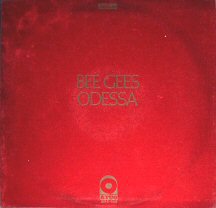
|
SD 2-702 - Odessa - Bee Gees [1969] (2-69, #20) (2-LP set) Gatefold cover. The
original cover on this album had a velvet like covering, the second version had a standard cover. No
group photos, but by the time this album was released, the Bee Gees were a quartet, with the Brothers
Gibb and drummer Peterson. Guitarist Vince Melouney, who left in December, 1968, was on the album
when it was recorded. "Produced by Robert Stigwood and the Bee Gees." Disc 1: Odessa/You'll
Never See My Face Again/Black Diamond//Marley Purt Drive/Edison/Melody Fair/Suddenly/Whisper
Whisper; Disc 2: Lamplight/Sound of Love/Give Your Best/Seven Seas Symphony/With All
Nations//I Laugh In Your Face/Never Say Never Again/First Of May/The British Opera
|
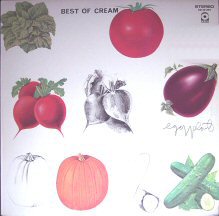
|
SD 33-291 - Best of Cream - Cream [1969] (7-69, #3) Credits include, "I Feel
Free is a Robert Stigwood Organisation (London) Production. All other selections were produced by
Felix Pappalardi by arrangement with Robert Stigwood. Released in the U.S.A. by special arrangement
with Polydor Records, Ltd." Sunshine of Your Love/Badge/Crossroads/White Room (3:04 version with
one verse edited out)/SWLABR [She Was Like A Bearded Rainbow]//Born Under a Bad
Sign/Spoonful/Tales of Brave Ulysses/Strange Brew/I Feel Free
|
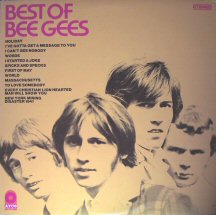
|
SD 33-292 - Best of Bee Gees - Bee Gees [1969] (2-69, #20) Liner notes indicate most
tracks as having been produced by Robert Stigwood and Ossie Byrne or the Bee Gees. "Released in the
U.S.A. by special arrangement with Polydor Records, Ltd." Pictured on the album are the three Gibb
brothers and drummer Colin Peterson, Melouney having left the group in December, 1968. Holiday
(S)/I've Gotta Get A Message To You (S)/I Can't See Nobody (S)/Words (S, original odd stereo mix)/I
Started A Joke (S)/Spicks And Specks (E)//First Of May (S)/World (S)/(The Lights Went Out In)
Massachusetts (S)/To Love Somebody (S)/Every Christian Lion Hearted Man Will Show You (S)/New
York Mining Disaster 1941 (S)
|
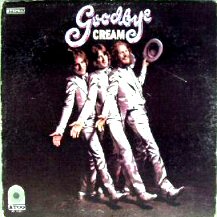
|
SD-7001 - Goodbye - Cream [1969] (2-69, #2) Gatefold cover. "Produced by Felix
Pappalardi by arrangement with Robert Stigwood. Released in the U.S.A. by special arrangement with
Polydor Records, Ltd." Sitting on Top of the World/Badge/Doing That Scrapyard Thing/What A
Bringdown//I'm So Glad/Politician
|
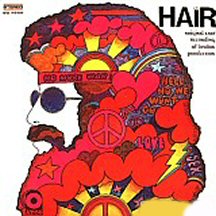
|
*SD-7002 - Hair (Original London Cast) - Galt MacDermot [1969] (5-69, #186) Abie
Baby/Ain't Got No/Air/Aquarius/Black Boys/Coloured Spade/Doona/Easy To Be Hard/Electric
Blues/Flesh Failures (Let The Sunshine In)/Frank Mills/Good Morning Starshine/Hair/I Got Life/My
Conviction/Sodomy/The Bed/Three-Five-Zero-Zero/Walking In Space/What A Piece Of Work Is
Man/Where Do I Go/White Boys
|
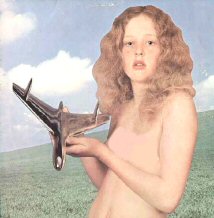
|
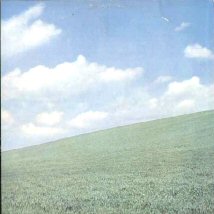 SD 33-304A - Blind
Faith - Blind Faith [1969] (8-69, #1) Issued with two different covers, designated Atco SD
33-304A (the "nude girl" cover as shown at left) and Atco SD 33 304B (the pale yellow cover showing a
photo of the group, below). The back cover of 304A (at right) shows the same photo a few moments
later, without the girl. This was the first cover, but it was quickly replaced with the cover shown below.
Blind Faith is: Eric Clapton, Steve Winwood, Ginger Baker, and Rick Grech. "Produced by Jimmy Miller
by arrangement with Robert Stigwood and Chris Blackwell. Released in the U.S.A. by special
arrangement with Polydor Records, Ltd. & Island Records, Ltd." Had to Cry Today/Can't Find My Way
Home/Well All Right/Presence of the Lord//Sea of Joy/Do What You Like SD 33-304A - Blind
Faith - Blind Faith [1969] (8-69, #1) Issued with two different covers, designated Atco SD
33-304A (the "nude girl" cover as shown at left) and Atco SD 33 304B (the pale yellow cover showing a
photo of the group, below). The back cover of 304A (at right) shows the same photo a few moments
later, without the girl. This was the first cover, but it was quickly replaced with the cover shown below.
Blind Faith is: Eric Clapton, Steve Winwood, Ginger Baker, and Rick Grech. "Produced by Jimmy Miller
by arrangement with Robert Stigwood and Chris Blackwell. Released in the U.S.A. by special
arrangement with Polydor Records, Ltd. & Island Records, Ltd." Had to Cry Today/Can't Find My Way
Home/Well All Right/Presence of the Lord//Sea of Joy/Do What You Like
|
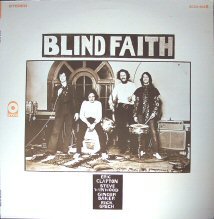
|
SD 33-304B - Blind Faith - Blind Faith [1969] (8-69, #1) Issued with two different covers,
designated Atco SD 33-304A (the "nude girl" cover as shown above) and Atco SD 33 304B (the pale
yellow cover showing a photo of the group, including Ginger Baker holding a guitar and Eric Clapton with
drumsticks), which is shown here. The yellow cover is by far the more common for this release. Back
cover has song lyrics, which were on an insert included with the album with the first cover. A note on the
back of 33-304B states "Atco 33-304A contains the same record as Atco 33- 304B." "Produced by
Jimmy Miller by arrangement with Robert Stigwood and Chris Blackwell. Released in the U.S.A. by
special arrangement with Polydor Records, Ltd. & Island Records, Ltd." Had to Cry Today/Can't Find My
Way Home/Well All Right/Presence of the Lord//Sea of Joy/Do What You Like
|
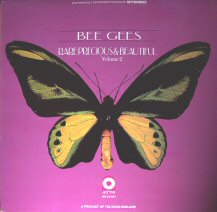
|
SD 33-321 - Rare, Precious and Beautiful, Volume 2 - Bee Gees [1970] (3-70, #100) A
second compilation of sides recorded in Australia for Festival Records. Liner notes by Robert Stigwood.
"Released in the U.S.A. by special arrangement with Polydor Records, Ltd." I Was A
Lover, A Leader Of Men (E)/Follow The Wind (E)/Claustrophobia (E)/Theme From The Travels Of Jamie
McPheeters (E)/Everyday I Have To Cry (E)/Take Hold Of That Star (E)//Could It Be (E)/To Be Or Not To
Be (E)/The Three Kisses Of Love (E)/Cherry Red (E)/All Of My Life (E)/Don't Say Goodbye (E)
|
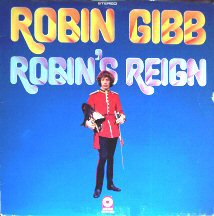
|
SD 33-323 - Robin's Reign - Robin Gibb [1970] Produced by Robin Gibb. This album
was only indirectly associated with Robert Stigwood. Robin and brother Barry had been at odds as to
who was the leader of the Bee Gees, and brought the argument to their manager, Robert Stigwood.
When Stigwood indicated he preferred Barry as the leader, Robin quit the group in a fit of pique, and
recorded a solo album for Atco. He wrote and produced all the songs on the album. It was a disaster,
saleswise, as it didn't even make the "Bubbling Under" charts here, although "Saved By the Bell" was a
hit in England. His two brothers recorded the Cucumber Castle album (below) as a duo version
of the Bee Gees, which charted. Seeing little future in a solo career at that point, Robin rejoined his
brothers later in 1970 in time to record the 2 Years On album. August October/Gone Gone
Gone/The Worst Girl In This Town/Give Me A Smile/Down Came The Sun/Mother And Jack//Saved By
The Bell/Weekend/Farmer Ferdinand Hudson/Lord Bless All/Most Of My Life
|
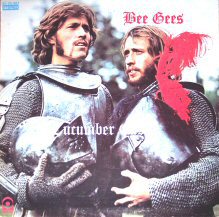
|
SD 33-327 - Cucumber Castle - Bee Gees [1970] (5-70, #94) Gatefold cover. The Bee
Gees were down to two members, with Colin Peterson having left in August, 1969, about the time the
blowup with Robin occurred. These songs are noted as being from the "Bee Gees television spectacular
Cucumber Castle." Credits include, "Released in the U.S.A. by special arrangement with the
Robert Stigwood Organisation." If Only I Had My Mind On Something Else/I.O.I.O./Then You Left
Me/The Lord/I Was The Child/I Lay Down And Die//Sweetheart/Bury Me Down By The River/My
Thing/The Chance Of Love/Turning Tide/Don't Forget To Remember
|
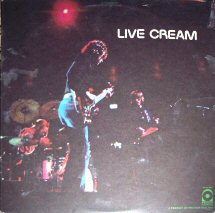
|
SD 33-328 - Live Cream - Cream [1970] (5-70, #15) "Lawdy Mama" was produced by
Ahmet Ertegun and Robert Stigwood; others produced by Felix Pappalardi. Credits include, "Produced
by arrangement with the Robert Stigwood Organisation" and "Released in the U.S.A. by special
arrangement with Polydor Records, Ltd., London." N.S.U./Sleepy Time Time/Lawdy
Mama (studio rcording)//Sweet Wine/Rollin' and Tumblin'
|
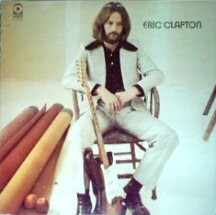
|
SD 33-329 - Eric Clapton - Eric Clapton [1970] (7-70, #13) "Produced by Delaney
Bramlett by arrangement with the Robert Sigwood Organisation, Ltd." Slunky/Bad Boy/Lonesome
And Long Way From Home/After Midnight/Easy Now/Blues Power//Bottle Of Red Wine/Lovin' You Lovin'
Me/Told You For The Last Time/Don't Know Why/Let It Rain
|
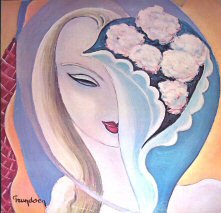
|
SD 2-704 - Layla and Other Assorted Love Songs - Derek and the Dominos [1970]
(11-70, #16) (2-LP set) Gatefold cover. Robert Stigwood is not mentioned. "Released in the U.S.A. by
special arrangement with Polydor Records, Ltd., London." Cover lists "Derek & the Dominos" as: Eric
Clapton, Bobby Whitlock, Jim Gordon, Carl Radle, and Duane Allman. Disc 1: I Looked
Away/Bell Bottom Blues/Keep On Growing/Nobody Knows You When You're Down And Out//I Am
Yours/Anyday/Key To The Highway; Disc 2: Tell The Truth/Why Does Love Got To Be So
Sad?/Have You Ever Loved A Woman//Little Wing/It's Too Late/Layla/Thorn Tree In The Garden
|
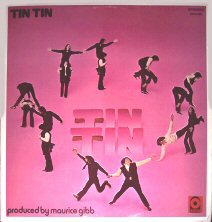
|
SD 33-350 - Tin Tin - Tin Tin [1970] (6-71, #197) Tin Tin was guitarist/bassist Steve
Groves and keyboardist Steve Kipner."Produced by Maurice Gibb by arrangement with
the Robert Stigwood Organisation, Ltd." Maurice Gibb plays bass on four tracks, all four of which are
essentially mono on the album. These four sides were originally on two early singles, recorded for a
small label and picked up by Polydor. She Said Ride (S)/Swans On The Canal (S)/Flag-Put Your Money
On My Dog (S)/Nobody Moves Me Like You (S)/Tuesday's Dreamer (S)/Only Ladies Play Croquet
(E)//Family Tree (S)/Spanish Shepherd (S)/He Wants To Be A Star (E)/Toast And Marmalade For Tea
(E)/Come On Over Again (S)/Manhattan Woman (E)/Lady In Blue (S)
|
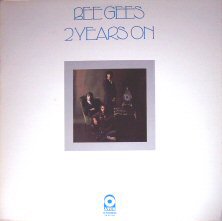
|
SD 33-353 - 2 Years On - Bee Gees [1970] (1-71, #32) Gatefold cover. Album shows the
three Gibb brothers as the group. This is the way it would remain. "Produced by Robert Stigwood and
Barry, Robin, and Maurice Gibb. Released in the U.S.A. by special arrangement with the Robert
Stigwood Organisation." 2 Years On/Portrait Of Louise/Man For All Seasons/Sincere Relation/Back
Home/The 1st Mistake I Made//Lonely Days/Alone Again/Tell Me Why/Lay It On Me/Every Second,
Every Minute/I'm Weeding
|
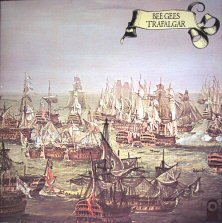
|
SD-7003 - Trafalgar - Bee Gees [1971] (9-71, #34) Gatefold cover. "Produced by Robert
Stigwood and the Bee Gees. Released in the U.S.A. by special arrangement with the Robert Stigwood
Organisation." How Can You Mend A Broken Heart/Israel/The Greatest Man In The World/It's Just The
Way/Remembering/Somebody Stop The Music//Trafalgar/I Don't Wanna Live Inside Myself/When Do
I/Dearest/Lion In Winter/Walking Back To Waterloo
|
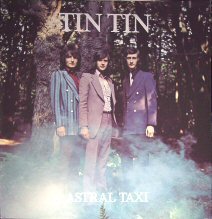
|
SD 33-370 - Astral Taxi - Tin Tin [1971] Gatefold cover. Groves and Kipner added
various musicians, including drummer Geoff Bridgford, guitarist Billie Lawrie, and guitarist Johnny Vallins
and toured with the Bee Gees. Groves, Kipner, and presumably Vallins are pictured on the album.
Credits include, "Produced by Tin Tin and Billie Lawrie for Moby Productions, by arrangement with the
Robert Stigwood Organisation. Executive producer: Maurice Gibb." Astral Taxi (S)/Ships On The
Starboard (S)/Our Destiny (S)/Tomorrow Today (S)/Jenny B. (S)//I Took A Holiday (S)/Tag Around
(S)/Set Sail For England (S)/The Cavalry's Coming (S)/Benny The Wonder Dog (S)/Is That The Way (S)
|
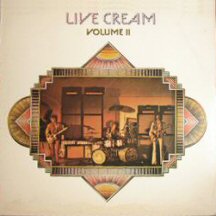
|
SD-7005 - Live Cream, Volume 2 - Cream [1972] (4-72, #27) "Produced by Felix
Pappalardi by arrangement with the Robert Stigwood Organisation, Ltd. Released in the U.S.A. by
special arrangement with Polydor Records, Ltd., London." Deserted Cities Of The
Heart/White Room/Politician/Tales Of Brave Ulysses//Sunshine Of Your Love/Hideaway
|
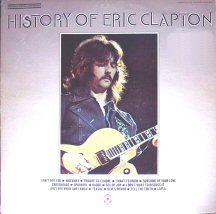
|
SD-2-803 - History of Eric Clapton - Eric Clapton with Various Bands [4/72] (4-72, #6) 2-
LP set. Gatefold cover. Many of the tracks are noted as being "By arrangement with the Robert
Stigwood Organisation." . The album is "A product of Polydor-England." Disc 1: I Ain't Got You -
Yardbirds/Hideaway - John Mayall's Bluesbreakers/Tribute To Elmore - Eric Clapton & Jimmy Page/I
Want To Know - Powerhouse (vocal by Steve Anglo)/Sunshine Of Your Love - Cream/Crossroads -
Cream//Spoonful - Cream/Badge - Cream; Disc 2: Sea Of Joy - Blind Faith/Only You Know And
I Know - Delaney & Bonnie & Friends/I Don't Want To Discuss It - Delaney & Bonnie & Friends/Teasin' -
King Curtis/Blues Power - Eric Clapton//Tell The Truth - Derek & Dominos (45 version, produced by Phil
Spector)/Tell The Truth - Derek & Dominos (previously unissued jam)/Layla - Derek & Dominos
|
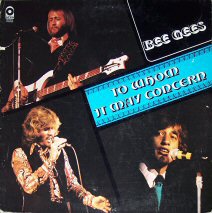
|
SD-7012 - To Whom It May Concern - Bee Gees [1972] (11-72, #35) Gatefold cover.
"Produced by the Bee Gees and Robert Stigwood. Released in the U.S.A. by special arrangement with
the Robert Stigwood Organisation." We Lost The Road/Never Been Alone/Paper Mache, Cabbages And
Kings/I Can Bring Love/I Held A Party/Please Don't Turn Out The Lights//Sea Of Smiling Faces/Bad Bad
Dreams/You Know It's For You/Alive/Road To Alaska/Sweet Song Of Summer
|
|
At this point, the RSO label begins. Discography continued in Part 2 |
 On to the RSO Discography, Part 2 The RSO Label
On to the RSO Discography, Part 2 The RSO Label  On to the RSO Discography, Part 3 Post-RSO Polydor
Issues
On to the RSO Discography, Part 3 Post-RSO Polydor
Issues Back to the Discography Listings Page
Back to the Discography Listings Page  Back to the Both Sides Now Home Page
Back to the Both Sides Now Home Page